Why Visit the Dentist Twice a Year? Essential Reasons

Nearly 100 million Americans skip their yearly dentist visit, says the CDC. This large number shows a big gap in our health habits. It’s strange since going to the dentist twice a year is key. Regular dental care keeps our smiles bright and healthy, just like regular car maintenance keeps a car running smoothly.
Dentists agree that we should visit every six months. This schedule is based on real benefits. Regular visits prevent tooth decay and catch serious problems early, like oral cancer. These visits could save your life.
Regular dentist visits are a smart financial move too. Many insurance plans cover check-ups, so it’s easy on your pocket. Early treatment stops bigger, costlier issues later. Dentists also offer advice to stop bad habits, keeping your teeth in top shape.
Teaching kids to visit the dentist regularly is important. It builds good habits for life. After a cleaning, your teeth look great and you feel healthy. There’s barely any reason to miss these visits.
Key Takeaways
- The glaring necessity for biannual dental visits to maintain oral hygiene and overall health.
- How an optimal biannual visitation schedule proves economically wise by leveraging insurance coverage for preventive care.
- The instrumental role that regular dental checkups play in education and the early detection of health-threatening conditions.
- Creating a lasting dental care routine that includes these essential visits, ensuring lifelong benefits.
- The impact of exemplifying a diligent dental care routine for the younger generation, breeding a culture of health consciousness.
Understanding the Importance of Regular Dental Visits
Going to the dentist regularly is about more than just keeping your smile bright. These visits are important for great dental health and your general health too. By keeping up with dental checkup frequency, good dental hygiene habits, and knowing the benefits of regular dental exams, you can greatly improve your life.
The Basics of Dental Health
Adding dental checkups to your health routine prevents many mouth issues. These check-ups can catch dental problems early. Following dental hygiene habits recommended by professionals helps stop cavities and gum disease.
The Impact on Overall Health
Regular dental visits are good for your teeth and give clues about your body’s health. They can show signs of nutritional issues, infections, or serious conditions like diabetes. So, a steady dental checkup frequency helps catch and manage these health problems early.
Preventive Care: The First Line of Defense
Preventive care is crucial for both dental and general health. Regular dental checks are important for keeping teeth looking and working well. They also help prevent tooth and gum diseases. How often you see a dentist greatly affects how well this care works.

There are two main parts to preventive care: check-ups and cleanings. These help spot problems early, before they get serious. Knowing the advantages of seeing a dentist every six months helps you stop decay and gum disease early. This means you won’t need as many big dental treatments later.
- Monitoring Plaque and Tartar Buildup: Regular cleanings stop plaque and tartar from turning into harmful bacteria nests.
- Checking for Early Signs of Decay: Finding and fixing small problems early stops bigger issues later.
- Guidance on Dental Hygiene: Dentists give personalized tips for better oral care at home.
Preventive care saves money in the long run. It helps avoid expensive emergencies and surgeries that come from waiting too long for treatment. Making regular dental appointment frequency a part of your health routine leads to a healthier life and saves money.
Early Detection of Dental Issues
Going to the dentist regularly is crucial for keeping your mouth healthy. It also helps catch problems early, before they get worse. These biannual dental visits are key for finding tooth decay, gum disease, and more at an early stage. Seeing your dentist every six months does more than check for cavities. It includes a full health review, like checking for oral cancer.
Common Dental Problems Found Early
- Cavities and early signs of tooth decay
- Gum disease, including gingivitis and periodontitis
- Enamel wear which might suggest dietary issues or bruxism
- Signs of failing old fillings or other dental restorations
- Early indications of oral cancer
Benefits of Catching Problems Early
Finding dental problems early has many advantages. It leads to better outcomes and treatments that are less harsh and more affordable. Thanks to biannual dental visits, you can avoid worse issues and keep your teeth healthy.
| Condition | Advantages of Early Detection |
|---|---|
| Cavities | Minimizes need for extensive treatments like root canals or crowns |
| Gum Disease | Allows for non-surgical treatments and better gum health management |
| Oral Cancer | Increases the success rate of treatment and survival rates |
| Enamel Wear | Enables dietary and habit counseling to prevent further damage |
Professional Cleaning and Oral Hygiene
Dental hygienists are key to keeping our teeth healthy. They focus on preventive care and essential dental hygiene routines. Their knowledge fights off plaque and tartar. They also teach people how to care for their teeth at home.
The Role of a Hygienist
Dental hygienists aim to stop oral health problems before they start. They do professional cleanings, called scale and polish, to get rid of harmful buildups. If not cleaned, these can cause serious tooth problems.
They also teach patients the right dental hygiene habits. This helps keep teeth healthy for a long time. They show why regular dental check-ups are important.
Techniques Used in Professional Cleanings
- Scaling: Removes plaque and tartar from the tooth surface.
- Polishing: Smoothens the surface of the teeth after scaling, making it harder for plaque to adhere.
- Fluoride Treatments: Helps in reinforcing the tooth enamel and reducing decay.
Professional cleaning techniques ensure your teeth stay healthy. They help prevent future dental problems.
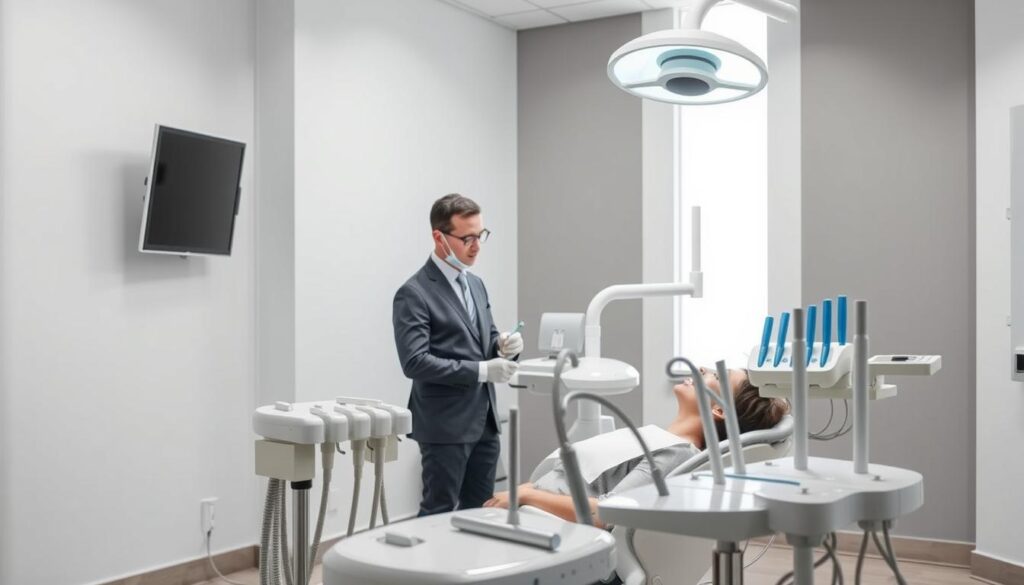
Maintaining Healthy Gums
Keeping your gums healthy is crucial for your overall body health. Knowing how cleaning your teeth and regular dental check-ups help is key. This helps prevent and treat mouth diseases.
Your gum health can show if you have other health problems like diabetes or heart issues. Taking care of your teeth well is very important.
The Link Between Gum Health and Systemic Conditions
Studies show a strong connection between gum health and other health problems. People with gum diseases are more likely to get heart diseases. This shows why seeing your dentist regularly is important to catch and treat gum problems early.
Signs of Gum Disease to Watch For
Noticing early signs of gum disease can really help. Look out for bleeding gums, bad breath, and swollen gums. If you see these signs, see your dentist. Going to the dentist twice a year is important for your mouth and overall health.
Personalized Oral Health Plans
Every patient has a unique journey in oral health, needing a personalized dental care routine. This plan should consider their medical history and way of life. Dentists are key in creating these plans. They focus on how regular dental check-ups can help maintain or better oral health.
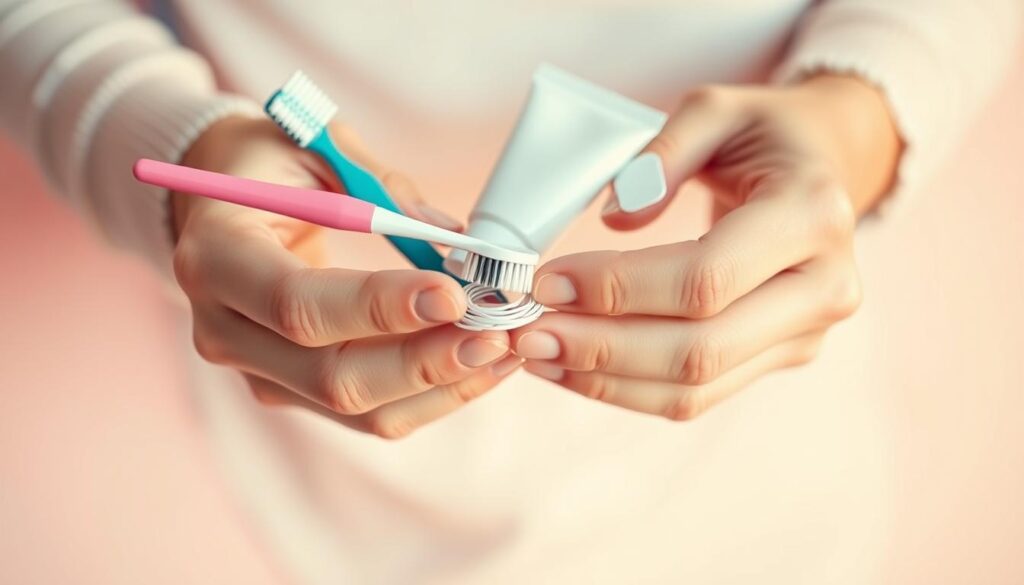
- Detailed look at the patient’s dental and medical past
- Checking the current state of dental health and possible risks
- Thinking about lifestyle choices that might affect oral health
This custom method doesn’t just fix current problems. It also looks ahead to stop future issues, creating a forward-thinking attitude toward dental health. Plus, updating dental history during each visit makes sure the dental plan stays in line with the patient’s changing needs.
| Aspect | Benefits |
|---|---|
| Personalized Dental Plans | Focuses on specific dental problems, looks forward to stop future issues, adjusts to health and lifestyle changes. |
| Regular Updates in Dental History | Keeps the dental plan up-to-date and effective, leading to better oral health in the long term. |
The benefits of customized plans lead to a preventive strategy that greatly lowers oral disease risks. Highlighting the value of getting dental check-ups often doesn’t just protect your oral health. It also makes your overall life better. Keeping your dental history current is key to making sure your specific dental care plan works well.
Education on Proper Oral Hygiene Practices
Going to the dentist regularly is a great chance for everyone to improve their oral hygiene. During these visits, you get personal advice from experts about the best oral care methods. These moments are key to keeping your teeth healthy for a long time.
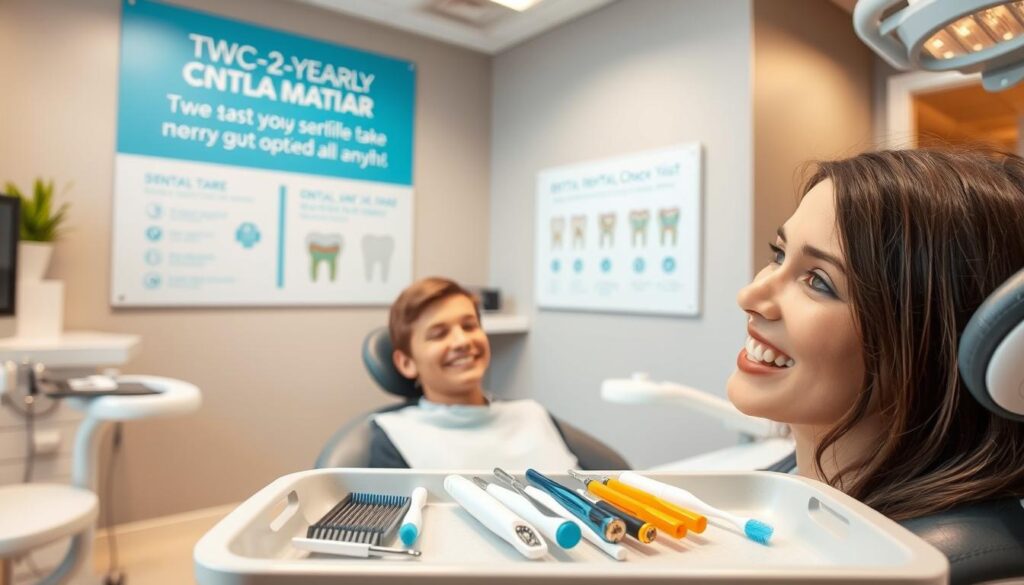
At the dentist, learning about good dental habits is a major focus. You learn how to brush correctly, why flossing matters, and how to use mouthwash the right way. Knowing these things helps prevent dental problems later on.
Dentists also talk about how often you should visit them for check-ups. These regular visits are very important for stopping dental issues early on. Here’s what they usually suggest for keeping your teeth in top shape with regular visits:
| Age Group | Recommended Visit Frequency |
|---|---|
| Children and Adolescents | Every 6 months |
| Adults | Every 6 to 12 months |
| Seniors | Every 4 to 6 months |
It’s vital to keep up with the latest in dental hygiene to follow the best practices for your health. Through regular visits to the dentist and following their schedule advice, you can make sure your oral health is the best it can be.
Addressing Aesthetic Concerns
Going to the dentist every six months is often linked to health. But, these visits also let us look into cosmetic dentistry options. Fixing the look of our teeth is not just about beauty. It’s about feeling good and confident too.
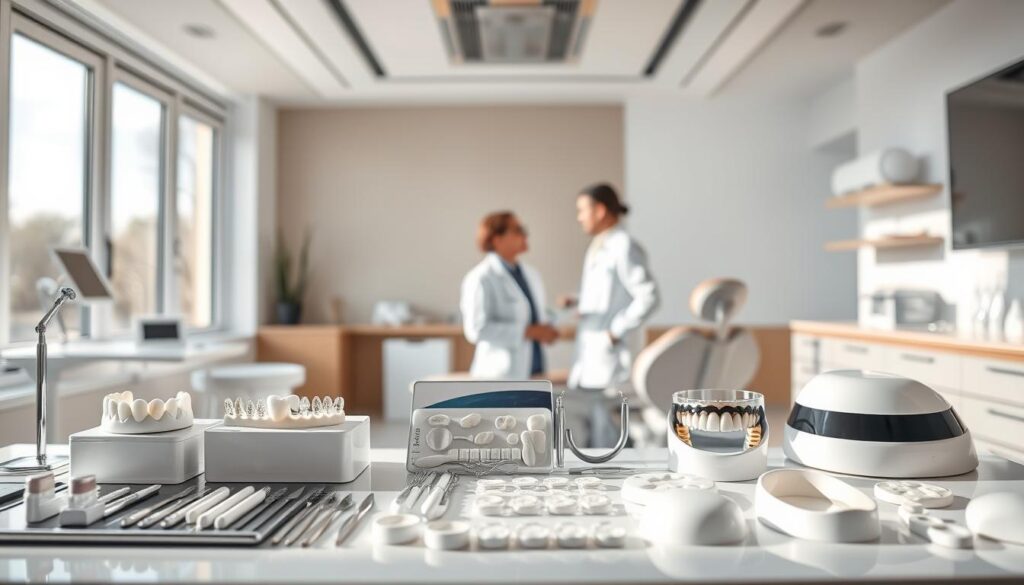
Today’s dental clinics have many treatments to make smiles better. This can positively affect how we act in personal and work settings. Whether it’s making teeth whiter or straightening them, the modern cosmetic solutions available can fix almost any issue. Plus, advances in technology make these treatments easier and outcomes more reliable.
- Teeth Whitening: Makes teeth brighter and removes stains from things like coffee, tea, and red wine.
- Veneers: These are custom shells that improve the look of teeth by changing their color, shape, size, or length.
- Invisalign: A newer way to straighten teeth with a set of aligners made just for you.
Wanting to look better can also push people to not skip dental check-ups. It makes sure your teeth are healthy and look great. This encourages sticking to dental visits and care, highlighting the importance of biannual dental visits.
Combining beauty treatments with regular dental care takes a full view of oral health. It makes dental visits about more than just avoiding problems. They also become a time to make your smile prettier. This approach boosts how you feel and enjoy your dental visits.
Managing Existing Dental Conditions
For people with dental issues, knowing how often to see the dentist is key to managing dental conditions. Conditions like periodontitis need ongoing checks. These are possible only with regular dental visits.
Going to the dentist regularly is vital. It’s not just for care but also to adjust treatments as your oral health changes. At these visits, dentists check how well treatments are working. They make changes if needed to get the best results.
To find out more about staying on top of dental care, click dental exam and cleaning. Getting checked often is key to avoiding problems and keeping your mouth healthy.
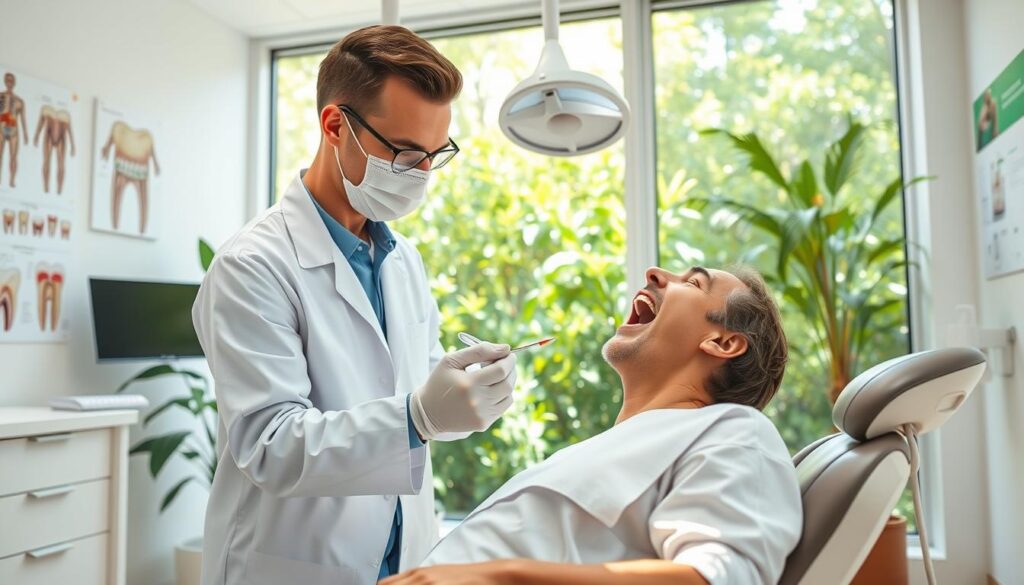
Handling dental conditions well can ease symptoms and prevent future problems. People with chronic conditions should follow their dentist’s advice closely. This helps keep their mouths healthy.
Making changes to treatment plans when needed shows how dentists actively work to help patients. Custom treatments can greatly improve life for those with ongoing dental issues.
Knowing how to manage dental conditions with regular dental appointments can greatly impact your health and happiness. Regular visits allow dentists to monitor conditions closely. They make sure treatment keeps up with the patient’s needs.
Enhancing Overall Health and Wellbeing
Oral health deeply affects our overall well-being, including both our physical and mental states. Having regular dental checkups is key to a healthy, active life. The benefits of regular dental exams go beyond clean teeth; they help prevent serious diseases.
A healthy mouth is linked to a healthy body, which is why good oral hygiene is vital. Regular dental visits can spot early issues, leading to a healthier life overall.
Physical Health: Research has found connections between oral issues like gum disease and major health problems such as heart disease, diabetes, and lung conditions. Keeping up with dental visits every six months can improve not just oral health but our overall health too. These check-ups are not just for immediate dental needs but also help prevent bigger health issues.
Mental Health: How we feel about our smile affects our mental health. Mental health benefits of a healthy smile include better self-confidence and less social anxiety. A good smile can change how we see ourselves and interact with others in every part of our lives.
Regular dental exams are crucial not only for oral health but for our overall health and happiness. These check-ups provide vital preventative care that benefits both our bodies and minds. It shows how important it is to care for our health in a comprehensive way.
Understanding the Risks of Skipping Visits
Skipping dentist appointments does more than harm your teeth; it can lead to serious health issues. Knowing why it’s key to see your dentist twice a year can stop many problems. Problems that come from not seeing your dentist often enough.
Consequences of Infrequent Dental Care
- Not catching dental diseases early, like cavities and gum disease, can cause bigger health issues.
- The cost goes up for treating advanced issues that could have been avoided with regular visits.
- Not having teeth and losing bone in your jaw can mess up how you feel about yourself and your life.
Long-Term Impact on Oral and General Health
Avoiding the dentist doesn’t just hurt your mouth. It can also affect your overall health. Dental health is linked to diseases like diabetes and heart disease.
It’s crucial to keep in mind how oral health affects your whole body’s health. Make sure to go to your dentist regularly. It helps keep your teeth healthy and can prevent bigger health problems.
The Role of Technology in Dentistry
Technology has hugely changed how we take care of our teeth. It has made patient care and treatment much better. The advancements in diagnostic tools stand out the most.
These tools help find problems early. This fits well with the goal of preventing dental issues. Also, when used with good dental care routines, it makes keeping teeth healthy easier.
Learn more about how technology makes going to the dentist better. It leads to better health and easier visits.
Advancements in Diagnostic Tools make dentists more precise. They also help patients feel more confident in their care. This confidence helps people keep up with their dentist visits.
Dentists can now create treatments that really fit each person. They use the latest tech and live data. This means less time in the dentist’s chair and a better visit overall.
These tech advances help find problems like decay early. They also help with root canal mapping and showing oral conditions. This prevents bigger dental issues later on.
Tech tools are changing dentistry from the ground up. They make regular check-ups more important. And they make treatments work better. So, every dental visit helps your oral and overall health more.
Insurance and Dental Visit Frequency
It’s key to understand how dental insurance coverage affects how often you see your dentist. Having good insurance coverage helps you keep up with dental check-ups every six months. This is crucial for your oral health.
Exploring dental insurance allows patients to fully use their benefits for preventive care. This helps keep their mouths healthy.
How Insurance Plays a Role in Visits
Dental insurance leads to disciplined, regular dental care for many. Most plans focus on preventive care, like bi-annual cleanings. These cleanings prevent costly dental work later on.
This support makes people visit their dentist every six months. It’s essential for keeping teeth and gums healthy.
Understanding Your Dental Coverage
To get the most out of dental insurance coverage, you need to know your policy well. Understanding your plan helps with budgeting and using all possible benefits. Checking your insurance details with your dentist regularly can show new options that might help you.
| Coverage Focus | Typical Coverage Percentage | Visit Frequency Supported |
|---|---|---|
| Preventive Care | 80% – 100% | Bi-annual Visits |
| Basic Procedures | 70% – 85% | As Needed |
| Major Procedures | 50% | As Approved |
Using dental insurance wisely is great for financial planning and keeps your teeth healthy. It matches the advantages of seeing a dentist every six months. This gives you a healthier smile and a smart approach to dental care.
Tips for Making the Most of Your Dental Visit
Before you see the dentist, some planning is key. Think about any changes in your mouth or overall health since your last check-up. Share updates on your health, any pain, or changes, and talk about how you take care of your teeth. This helps set the right plan for your visits. It makes the exam thorough and helps you work together with your dentist.
When you’re at the dentist, asking questions can really help. Find out how to better care for your teeth at home. Always ask why a treatment is needed and how it helps. If something’s unclear about taking care of your teeth, just ask. To know more about what happens at a dental visit, check out understanding your dental check-up.
Talking to your dentist can lead to care that’s just right for you. This kind of attention is key for keeping your teeth healthy for life. Remember, staying regular with visits and talking openly with your dentist keeps your mouth and body healthy.


